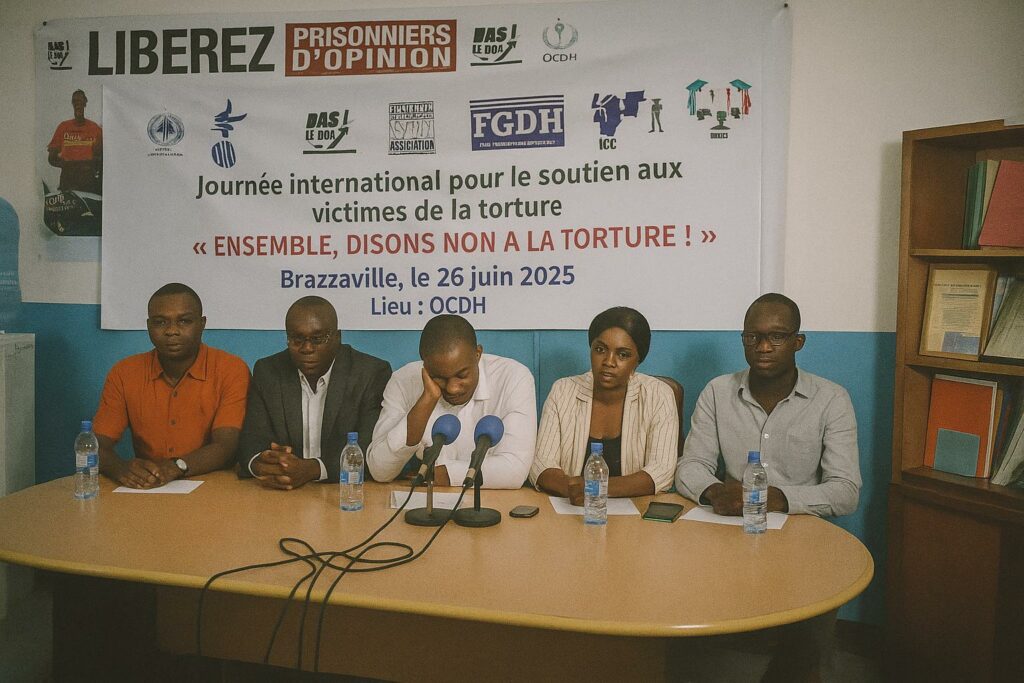Global commemoration, national soul-searching
On 26 June, as the United Nations marked the International Day in Support of Victims of Torture, the Consortium of Associations for the Promotion of Democratic Governance and the Rule of Law, better known by its French acronym Capged, released a statement that travelled swiftly through Brazzaville’s diplomatic circles. The five-member platform, which includes the Observatoire Congolais des Droits de l’Homme and the Groupe des Femmes pour la Défense des Droits de l’Homme, asserted that the frequency of torture in police custody and pre-trial detention had reached what it termed “worrying proportions”.
The communiqué landed in an environment already attuned to human rights metrics. Congo-Brazzaville ratified the United Nations Convention against Torture in 2003 and incorporated its key provisions in article 11 of the 2015 Constitution. International partners therefore greeted the alert not as a revelation but as a reminder that, two decades after accession to the treaty, implementation remains the crux of the matter.
A legal architecture that seeks consolidation
Since 2019 Brazzaville’s jurists have been working on a comprehensive revision of the Penal Code aimed at clarifying the notion of “crime of torture” in domestic law. A first draft, circulated to diplomatic missions in late 2022, mirrors article 1 of the Convention and foresees penalties of up to twenty years when the act is committed by an official. Speaking to the national broadcaster in March, Justice Minister Aimé-Angui Ange cited the reform as “proof that the Republic does not tolerate abuses perpetrated under the cover of authority”.
Observers nonetheless note that a statute, however precise, gains traction only when coupled with procedural safeguards. The government’s 2023–2027 National Human Rights Action Plan therefore includes a commitment to install audio-visual recording in major interrogation rooms and to guarantee detainees immediate access to counsel. The draft decree establishing a National Mechanism for the Prevention of Torture, required under the Optional Protocol signed in 2008, is expected to be tabled in the Senate during the next ordinary session.
Civil society vigilance and diplomatic resonance
Capged’s intervention reflects a broader continental trend whereby non-governmental actors act as early-warning systems for treaty-monitoring bodies. In its statement the consortium cited “recurring deaths” in custody and requested swift judicial inquiries, insisting that “torture must be named to be prosecuted”. That posture aligns with the concluding observations issued by the UN Committee against Torture in 2022, which welcomed Brazzaville’s cooperation yet urged it to “activate without delay” the preventive mechanism.
Foreign chancelleries read the episode through the lens of governance risk. An EU official in Brazzaville, requesting anonymity, said that “credible steps against ill-treatment are increasingly tied to budget-support disbursements”, an implicit reminder of the conditionality that now accompanies many development instruments. For its part, the United States referenced the Capged report in the 2023 Country Report on Human Rights Practices, while noting “constructive dialogue” with Congolese authorities over police training.
Government outreach and capacity-building initiatives
Responding to Capged, Interior Ministry spokesperson Léon-Paul Okombi underlined that the administration had already launched a pilot human-rights curriculum at the Police Academy with technical assistance from the UN Development Programme. He added that eighty senior officers completed the module in May and are expected to replicate it across regional commands. The programme complements existing collaborations with the International Committee of the Red Cross, which conducts periodic inspections of detention facilities upon invitation from the authorities.
Diplomats familiar with the file regard these measures as partial yet tangible. “The fact that Brazzaville allows unannounced visits by multilateral partners situates it ahead of several peers in Central Africa,” remarks a French legal adviser seconded to ECCAS. Such cooperative gestures, though unable by themselves to eradicate abusive practices, feed into a narrative of incremental institutional strengthening rather than systemic denial.
Regional context and comparative benchmarks
Congo-Brazzaville’s experience unfolds within the broader African governance architecture. At the 2023 session of the African Commission on Human and Peoples’ Rights in Banjul, the Congolese delegation highlighted progress toward aligning domestic legislation with the Robben Island Guidelines, the Commission’s soft-law instrument on the prohibition of torture. The delegation’s presentation drew polite acknowledgement, yet experts from Ghana and Rwanda cautioned that legislative harmonisation, while necessary, must translate into effective remedies for victims.
The peer discussion underscored that the Republic’s challenge lies not in an absence of norms but in the quest for operational capacity. From properly staffed forensic units to independent medical examinations, the technical prerequisites are costly but not insurmountable, provided that donor support and national budgetary allocations remain coherent. In that regard, Brazzaville’s forthcoming Public Finance Reform Plan, currently under review by the International Monetary Fund, may offer an opportunity to earmark resources for custodial oversight.
A cautiously optimistic trajectory
Capged’s alarm, far from being dismissed, appears to have prompted renewed governmental and diplomatic focus on the conditions of detention. The synergy between civil society monitoring, legislative refinement and international cooperation sketches a trajectory that, while uneven, is discernibly forward-looking. As a senior official in the Presidency’s Human Rights Directorate phrased it, “Our Constitution is explicit: the dignity of the person is sacred. The task ahead is to give those words a tangible administrative reality.”
Whether Congo-Brazzaville can entrench that reality will depend on sustained political will, reliable funding and the professionalisation of investigative bodies. For now, the conversation has left the realm of abstract principle and entered the demanding space of implementation—a space in which the Republic’s partners, from regional courts to bilateral donors, have a vested interest. Viewed through that prism, the latest alarm may ultimately serve as a catalyst for deeper reform rather than a verdict of failure.

